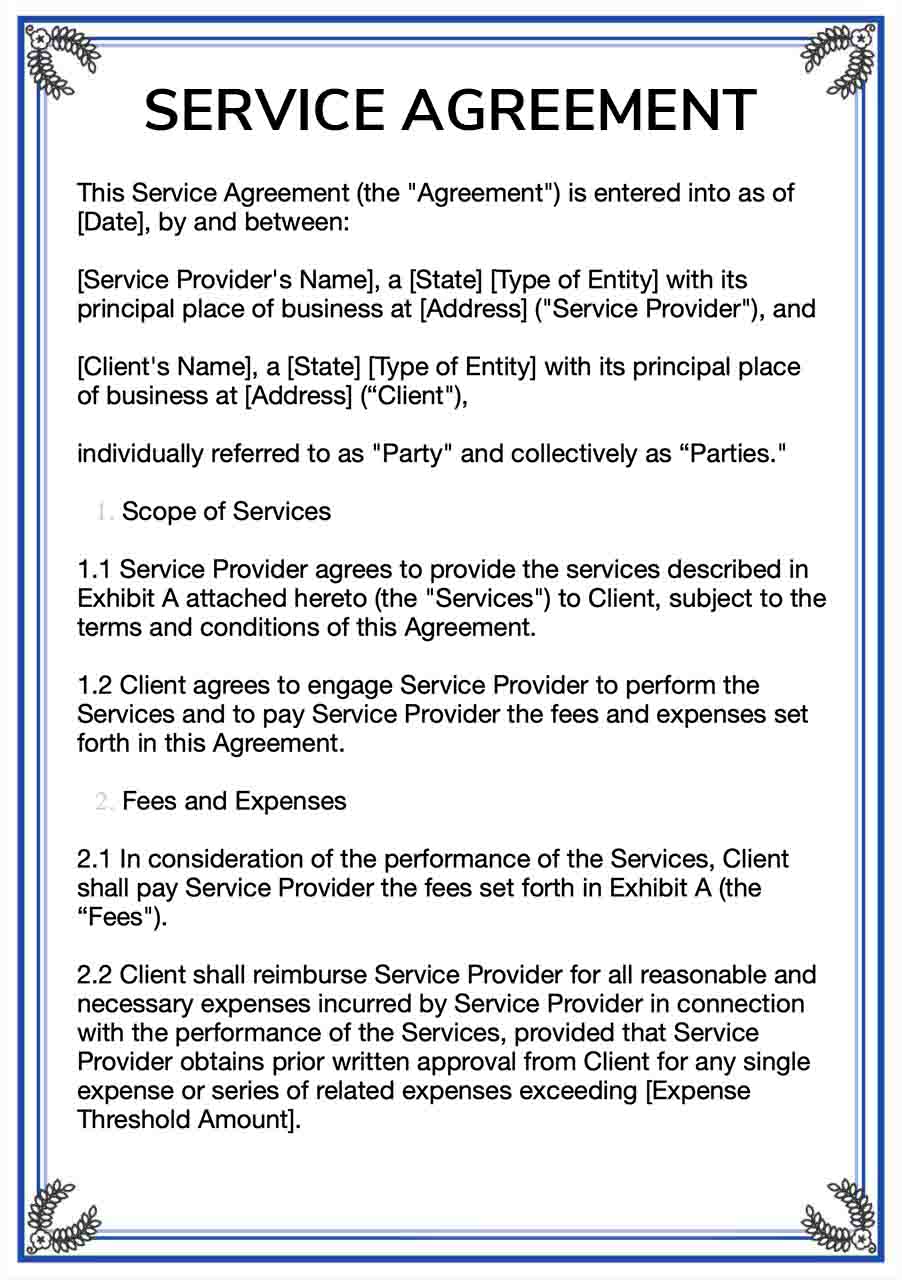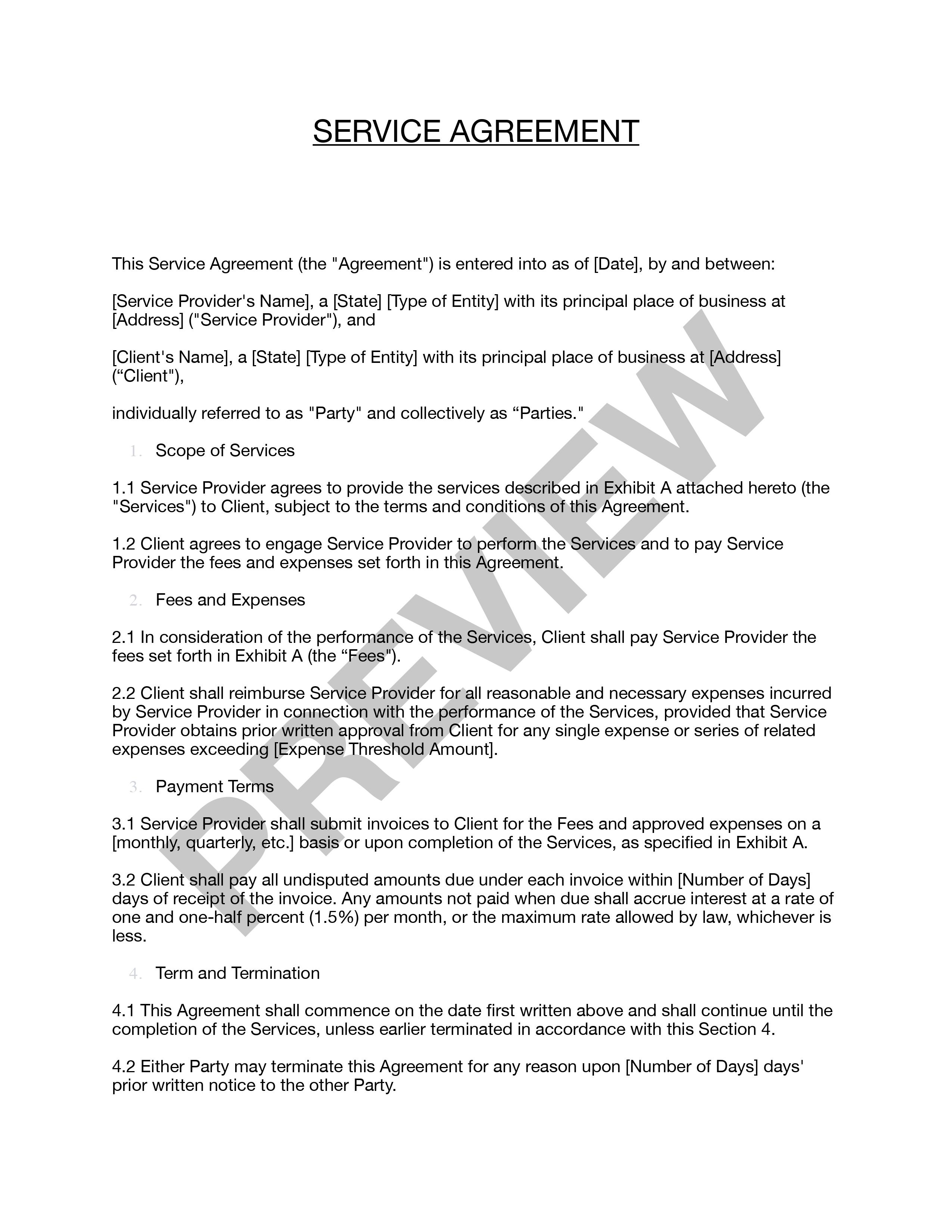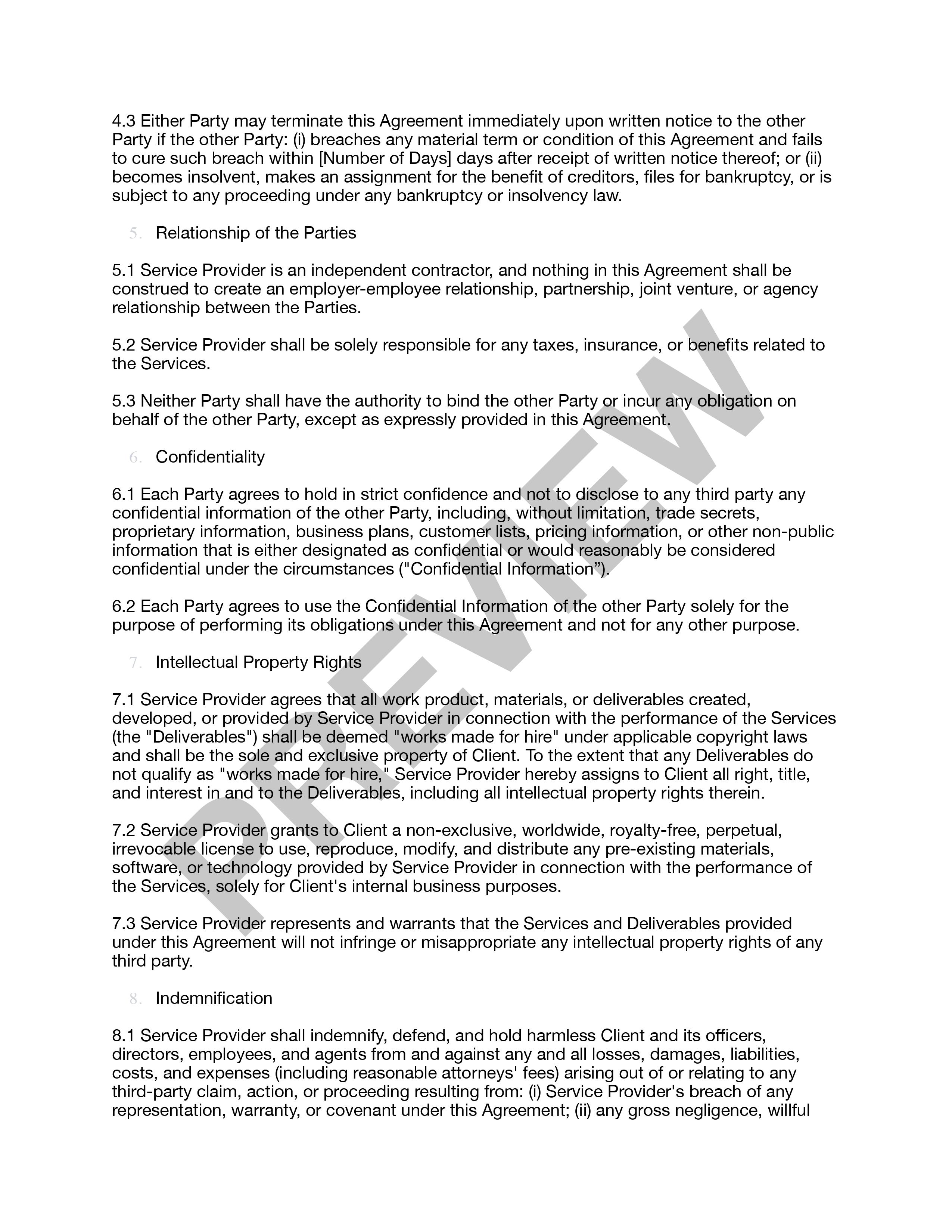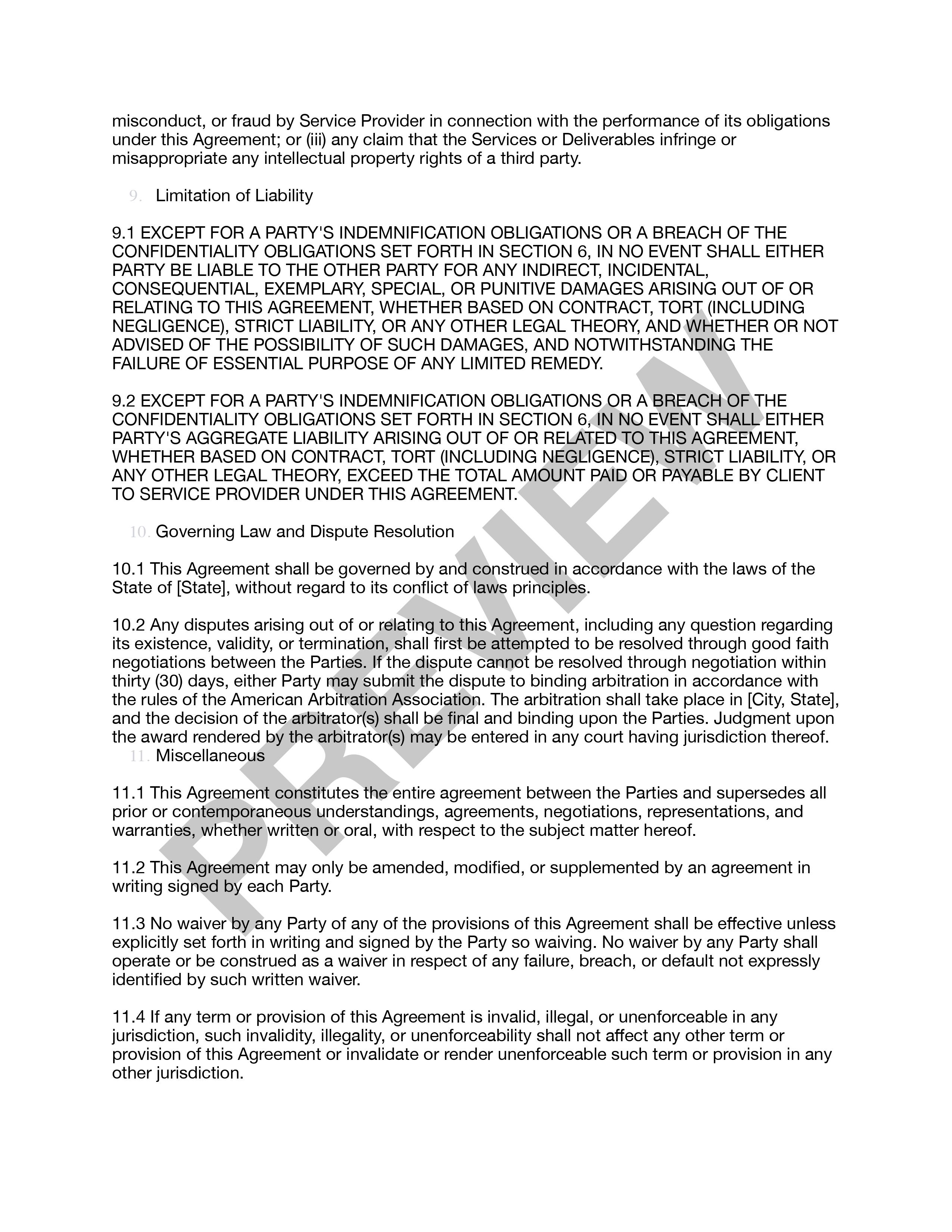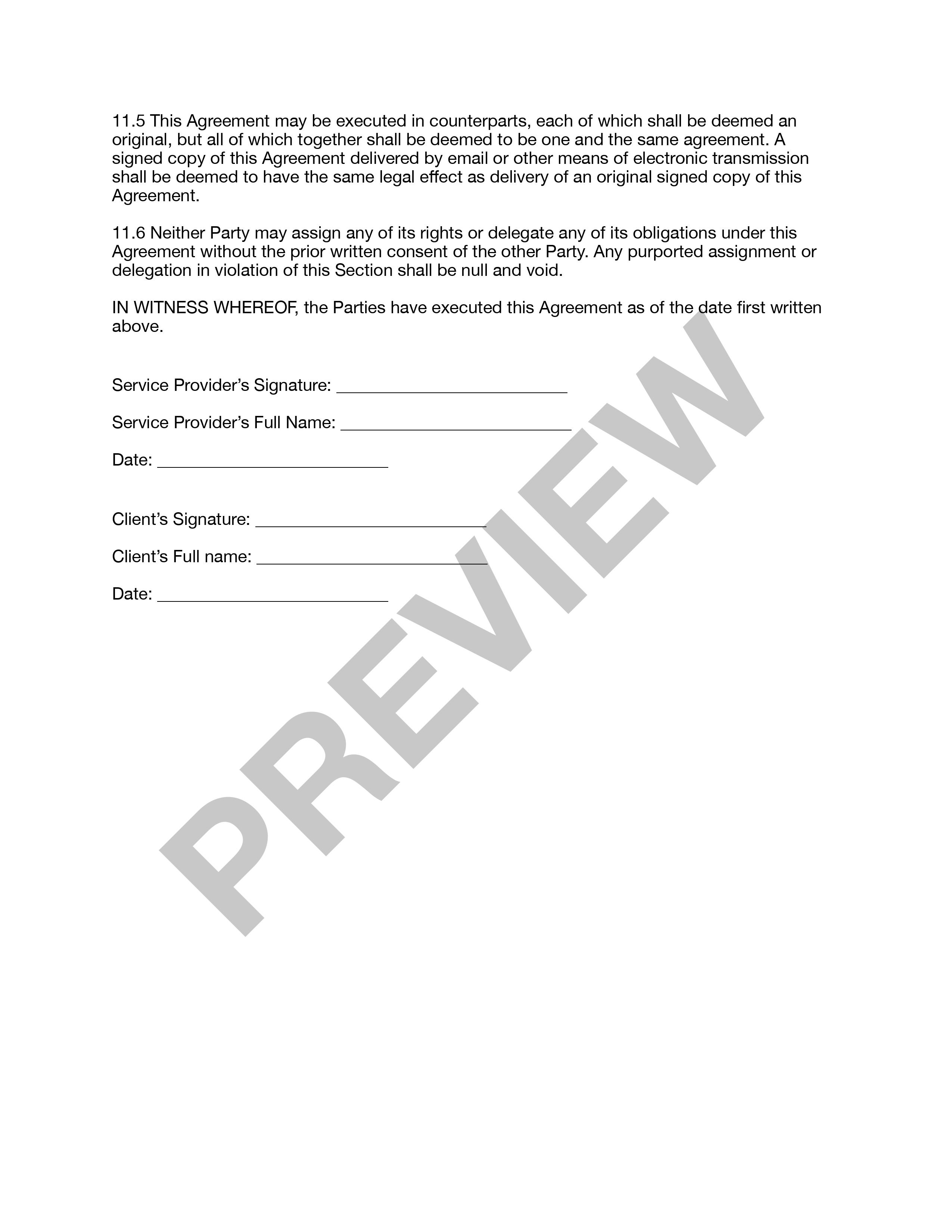Generate Service Agreement
A service agreement is a legally binding contract that outlines the terms and conditions governing the provision and use of services between a service provider and a client.
Last Updated April 2023
Alternative names:
Service Contract Service-Level Agreement (SLA) Service Provision Agreement Service ArrangementWhat is a Service Agreement?
A service agreement, also known as a service contract or a service-level agreement (SLA), is a legally binding contract between two or more parties that outlines the terms and conditions governing the provision and use of services. It serves as a written agreement that clarifies the rights, responsibilities, and expectations of both the service provider and the client.
Types of Service Agreements
There are various types of service agreements, depending on the nature of the services being provided and the industry involved. Some common types of service agreements include:
-
Professional Services Agreement: This agreement is used when engaging professionals such as consultants, lawyers, accountants, or other specialized service providers. It outlines the specific professional services to be rendered and may include provisions related to confidentiality, intellectual property, and liability.
-
IT Services Agreement: This agreement is used when engaging IT service providers, such as software developers, system administrators, or tech support companies. It covers services related to IT infrastructure, software development, network management, cybersecurity, or other IT-related activities.
-
Maintenance Service Agreement: This agreement is used for ongoing maintenance services, such as equipment maintenance, property upkeep, facility management, or regular servicing of machinery or systems.
-
Marketing or Advertising Services Agreement: This agreement is used when engaging marketing agencies, advertising firms, or digital marketing specialists. It outlines the marketing services to be provided, including campaign planning, content creation, media buying, or social media management.
-
Managed Services Agreement: This agreement is used when engaging managed service providers (MSPs). It covers comprehensive outsourced IT services, including network monitoring, data backup, software updates, help desk support, and other IT management tasks.
-
Consulting Services Agreement: This agreement is used when engaging consultants or advisory firms. It outlines the consulting services to be provided, such as strategic planning, business analysis, process improvement, or organizational development.
-
Outsourcing Services Agreement: This agreement is used when outsourcing certain business functions or processes to external service providers. It covers various outsourced services, such as customer support, human resources, payroll processing, or logistics management.
-
Event Services Agreement: This agreement is used when engaging event planning or management services. It outlines the services related to event coordination, venue management, vendor arrangements, logistics, or other event-specific tasks.
These are just a few examples of the different types of service agreements. The specific type of service agreement needed will depend on the nature of the services being provided and the specific requirements of the parties involved.
What should be included in a service agreement?
A comprehensive service agreement should include the following key components:
-
Parties Involved: The agreement identifies the parties involved, namely the service provider (the company or individual offering the services) and the client (the entity receiving the services).
-
Scope of Services: It clearly defines the nature and scope of the services to be provided. This section outlines the specific tasks, deliverables, and goals that the service provider is responsible for.
-
Service Level Expectations: If applicable, the agreement may include service level expectations or performance metrics that the service provider must meet. These may include response times, availability, uptime guarantees, or any other measurable criteria agreed upon between the parties.
-
Payment Terms: The agreement specifies the compensation structure and payment terms for the services rendered. It outlines the payment schedule, rates, and any additional fees or expenses that the client may be responsible for.
-
Duration and Termination: The agreement states the duration of the contract and the terms for termination or renewal. It may also include provisions for early termination, termination for cause, or dispute resolution mechanisms.
-
Confidentiality and Intellectual Property: If applicable, the agreement may address confidentiality and intellectual property rights. It clarifies the handling of sensitive information and ownership of any intellectual property developed during the provision of the services.
-
Liability and Indemnification: The agreement may outline the liability of each party and any limitations or exclusions of liability. It may also include provisions for indemnification, where one party agrees to compensate the other for certain losses or damages.
-
Governing Law and Jurisdiction: The agreement specifies the governing law and jurisdiction that will apply in case of any disputes or legal issues.
Service agreements can vary significantly depending on the nature of the services being provided and the industry involved. It is important for both parties to carefully review and understand the terms of the service agreement before entering into the contract to ensure that their rights and obligations are clearly defined and protected.
Why is a service agreement important?
A service agreement is important for several reasons:
-
Clarity and Understanding: A service agreement helps establish clear communication and understanding between the service provider and the client. It outlines the rights, responsibilities, and expectations of both parties, reducing the likelihood of misunderstandings or disputes.
-
Legal Protection: A service agreement provides legal protection for both the service provider and the client. It defines the terms and conditions of the services, establishes contractual obligations, and sets out remedies in case of breach or non-compliance.
-
Risk Management: By clearly defining the scope of services, limitations, and liabilities, a service agreement helps manage and mitigate risks associated with the provision of services. It clarifies issues such as liability for damages, intellectual property ownership, confidentiality, and compliance with applicable laws and regulations.
-
Dispute Resolution: A well-drafted service agreement includes provisions for resolving disputes. By outlining a dispute resolution process, such as negotiation or mediation, it provides a mechanism for addressing conflicts in a structured and efficient manner, potentially avoiding costly and time-consuming legal proceedings.
-
Expectation Alignment: A service agreement ensures that both parties have a shared understanding of what is expected from each other. It helps manage expectations regarding service quality, timelines, deliverables, and payment terms, fostering a more productive and satisfactory working relationship.
-
Professionalism and Reputation: Having a service agreement in place demonstrates professionalism and establishes credibility for both the service provider and the client. It instills confidence in the services being provided and demonstrates a commitment to clear and fair business practices.
-
Compliance with Legal Requirements: Depending on the industry and jurisdiction, certain services may have legal requirements or regulations that need to be addressed. A service agreement helps ensure compliance with these requirements, protecting both parties from potential legal issues or penalties.
Overall, a service agreement provides a solid foundation for a business relationship, setting expectations, managing risks, and protecting the rights and interests of both the service provider and the client. It establishes a framework for a transparent, fair, and mutually beneficial working arrangement.
Frequently Asked Questions
Yes, a service agreement can be modified or amended if both parties agree to the changes. The original agreement can be updated by drafting a written amendment that clearly outlines the agreed-upon modifications. The parties involved should engage in open communication, negotiate the changes, and then sign and execute the written amendment to make it legally binding.
Service agreements are used by a wide range of individuals, businesses, and organizations across various industries. The parties that typically use service agreements include:
-
Service Providers: Service providers are the entities or individuals offering services to clients. They may include professionals such as consultants, freelancers, contractors, technicians, or companies providing specialized services like IT support, marketing, accounting, legal advice, maintenance, or any other service-based offering.
-
Clients: Clients are the recipients of the services provided by the service providers. Clients can be individuals, businesses, organizations, or government entities seeking to obtain specific services to fulfill their needs. They engage service providers to address their requirements and benefit from their expertise.
-
Small Businesses and Startups: Small businesses and startups often utilize service agreements when engaging external service providers to assist them in areas outside their core competencies. These agreements help outline the services to be provided, establish expectations, and protect the interests of both parties.
-
Corporations and Enterprises: Large corporations and enterprises often enter into service agreements with service providers to meet their diverse business needs. These agreements can cover a wide range of services, such as technology consulting, software development, logistics, human resources, or facilities management.
-
Professional Service Firms: Professional service firms, such as law firms, accounting firms, engineering firms, or consulting agencies, commonly use service agreements to formalize their client engagements. These agreements establish the terms, fees, and obligations for the services rendered.
-
Nonprofit Organizations: Nonprofit organizations may engage service providers for various purposes, such as fundraising, event planning, marketing, or consulting services. Service agreements help define the scope of services and ensure that the service provider's activities align with the nonprofit's mission and goals.
-
Government Entities: Government agencies and departments often rely on service agreements to engage external service providers for specialized services or projects. These agreements help ensure compliance with procurement processes, establish service expectations, and protect the government's interests.
In summary, service agreements are utilized by a diverse range of parties seeking to engage in service-based relationships. They are commonly used by service providers and clients across different sectors and industries to define the terms, scope, and responsibilities associated with the provision of services.
While a service agreement and an independent contractor agreement are both types of contracts used in business relationships, they have distinct differences in their focus and purpose:
-
Service Agreement: A service agreement is a contract between a service provider and a client that governs the provision of services. It outlines the scope of services, payment terms, duration, and other relevant provisions. A service agreement can cover a wide range of services, including professional services, consulting, maintenance, or any other service-based arrangement.
-
Independent Contractor Agreement: An independent contractor agreement is a specific type of contract used when engaging the services of an independent contractor. It establishes the legal relationship between the hiring party (often referred to as the "client" or "company") and the independent contractor. The agreement clarifies that the independent contractor is not an employee but a separate entity providing services. It typically covers aspects such as the nature of the work, compensation, intellectual property, confidentiality, termination, and any specific terms relevant to the contractor's engagement.
In summary, a service agreement is a broader term that can cover a wide range of service-based arrangements, whereas an independent contractor agreement is a specific type of service agreement that focuses on the engagement of an independent contractor and the unique considerations related to that relationship. The independent contractor agreement specifically addresses the contractor's status as a separate entity and may include additional provisions related to compliance with tax laws, worker classification, and other legal requirements associated with engaging independent contractors.
In general, it is recommended to have service agreements in writing to avoid potential disputes and ensure clarity regarding the terms and conditions of the agreement. However, depending on the jurisdiction and the specific circumstances, verbal agreements may also be considered legally binding in certain situations. It is important to note that the enforceability of verbal agreements can vary based on the jurisdiction and the nature of the agreement.
In many cases, written service agreements provide more protection to both parties involved. They allow for a clear documentation of the agreed-upon terms, including services to be provided, payment details, timelines, warranties, limitations of liability, and dispute resolution mechanisms. Written agreements can help prevent misunderstandings and provide evidence in case of disagreements.
However, there may be situations where verbal agreements are considered valid and legally enforceable. For example, some jurisdictions recognize oral contracts for certain types of services or for agreements below a certain monetary threshold. Nevertheless, it is advisable to consult with a legal professional to understand the specific requirements and implications of verbal agreements in your jurisdiction.
The duration of a service agreement can vary depending on the specific terms and needs of the parties involved. There is no fixed standard duration for a service agreement, as it depends on factors such as the nature of the services, the industry, and the preferences of the parties. Here are a few common scenarios:
-
One-Time Service: In some cases, a service agreement may be for a one-time service or project. The agreement will specify the start and end dates of the project, and the agreement terminates upon completion.
-
Fixed-Term Agreement: A service agreement may have a specific duration, such as six months, one year, or multiple years. The parties agree to provide and receive services for the defined period mentioned in the agreement.
-
Ongoing Agreement: Some service agreements are open-ended and continue until one of the parties decides to terminate it. These agreements often include provisions for termination with a notice period specified by the parties.
The duration of a service agreement should be determined based on the specific requirements of the services being provided, the expected timeline, and the needs of the parties involved. It is common for service agreements to have provisions for renewal or extension upon mutual agreement if the relationship between the parties is ongoing and requires continued services.
When entering into a service agreement, it is important for both parties to discuss and agree upon the duration that aligns with their needs and objectives. Clearly defining the duration in the agreement helps establish expectations and ensures both parties are aware of the intended timeline for the provision of services.
